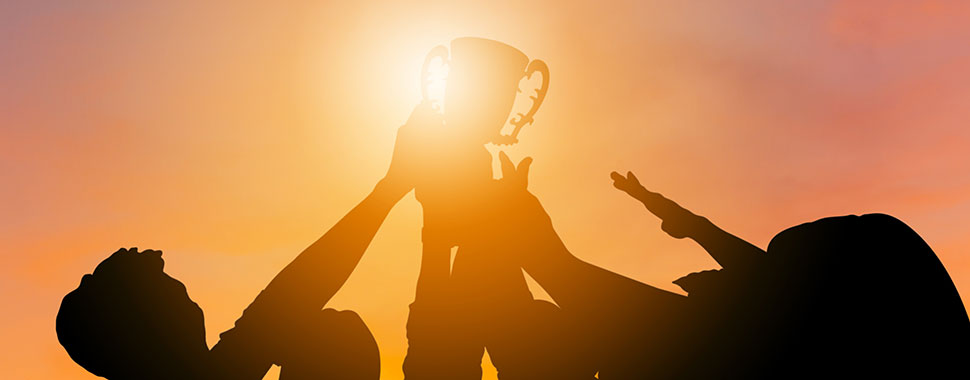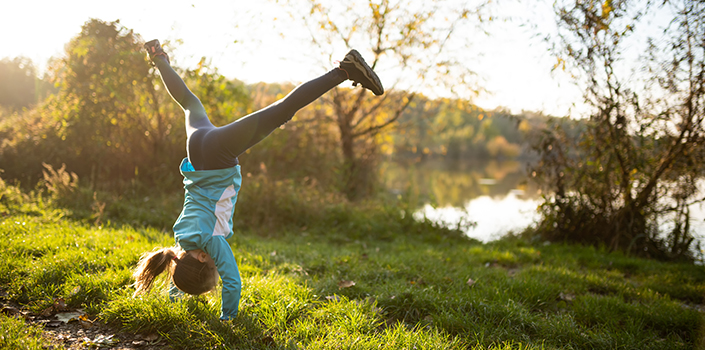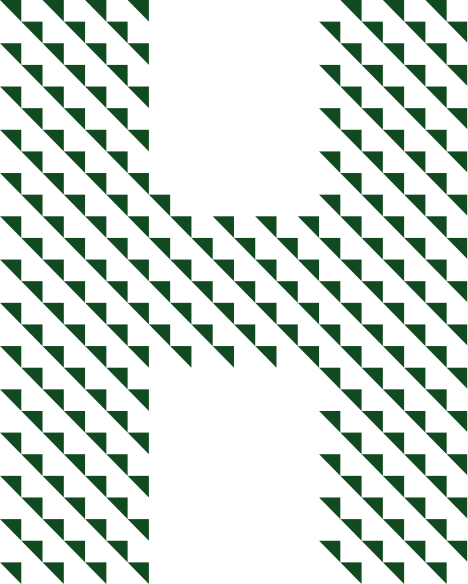(English) At Humana, we’re working to make healthcare more human by making it more personal, a little easier and whole lot more caring. That’s why we get to know our members as people first and members second. Our Past is Present series highlights real Humana members’ real stories. Stories of perseverance and triumph. Stories of good fights won and challenges overcome. Stories of how the past shapes the present—for the better.

Head over heels.
At eight years old, Richard A.’s energy could not be contained. “If I don’t have this kid on a leash,” his mom would say, “I can’t control him.” But a larger force was at play. Richard’s parents were getting a divorce. Sports were the only thing that helped Richard calm down. He played whatever was in season. He even took up ping-pong for a time, losing himself in game after game in Orchid Park across from his house. He’d stay at the park until long after the sunset. That’s where he stumbled onto gymnastics.
A former track and field Olympian coached kids at Orchid Park. He had a worn set of gray mats he’d roll out for the kids to practice somersaults, cartwheels and handstands. That’s where Richard first learned how to tumble. Practicing round offs and back handsprings worked out his extra energy.
In junior high, his physical education teacher taught him the high bar. That’s also when he came down with a 106-degree fever. His mom tried cooling him in an ice bath and later took him to the hospital. He had an extreme case of tonsillitis. Even though his tonsils were removed, the high fever made it unlikely that he would ever have children.
In high school, Richard, at the encouragement of the assistant gymnastics coach, tried out for the gymnastics team. Tryouts were simple: you made the team based on how long you could walk on your hands. Richard amazed the coaches by walking the full length of the gymnasium and back on his hands. He made the team on the spot. By his second meet, he had already earned his letterman’s jacket. Gymnastics taught Richard selflessness and humility. He could lose himself in the movements. Richard was on track to earn a gymnastics scholarship for college, but he missed it by half a grade point. Disappointed, he threw himself into work after graduation.
New possibilities.
Richard worked construction spring through autumn and took on odd jobs during the winter months when construction slowed down. He met his future wife, who was a single mom, while working at a paint store. As Richard tells it, they took one look at each other and knew something was there.
Around this time, he took up coaching gymnastics as one of his part-time jobs through a friend. He started coaching adults and then moved to kids. The kids’ program included a gym on wheels that traveled from school to school. This simple after-school program made Richard fall in love with coaching. He was surprised to find he was more satisfied as a coach than an athlete. As he and his wife tried unsuccessfully to have a child together, coaching became even more important. He started a gymnastics program for his local YMCA. Every summer, the Y’s gymnastics program took the kids to Big Bear Lake for a week-long camp to practice in nature. When the 1984 Olympics came to Los Angeles, Richard’s boys team made it to the state gymnastics championship.
He loved mentoring kids to help them achieve their dreams while teaching them how to have fun—and lots of it. “The best thing I could be for these kids,” Richard said, “is this biggest kid in the room.” Coaching increased his self-worth and playfulness. “Coaching gymnastics,” Richard says, “is what turned my life around.” It gave his life purpose and meaning. “I was happiest and most fulfilled when I was giving back to the kids.”

One of his favorite coaching memories was working with a boy who had cerebral palsy. The boy wanted to do the vault, but his left arm was underdeveloped. Undeterred, Richard came up with a training plan. Richard strengthened the boy’s right arm. He spotted him over and over again on the vault. Eventually, the boy performed a one-armed handspring on the vault. “That was a triumph,” Richard said, “I’ll never forget that moment.” Moments like that spurred Richard forward. They made the long days and sore muscles worth it.
Gymnastics became an opportunity for community engagement. California Sun Gymnastics’ mobile trailer, rigged up with equipment, was a staple at local events and holiday parades. Richard spotted the kids as they performed their routines for the audience. “It was a blast,” he said. He earned an honorary bronze medal from the National Gymnastics Association for his dedication to the sport. “In every respect of my being,” Richard says, “gymnastics played a role in one way or another.”
Filled with gratitude.
Around 2000, Richard had to pull back from coaching to care for his aging parents. He traveled back and forth between California and Arizona for several years. When he and his wife retired, they sold their condo in California and moved to be near her family in Texas; they moved in right next door, in fact.
There’s a YMCA about a mile from Richard’s house. “I happened in a long time ago,” he said, to enquire about their kids’ programs. They had soccer and swimming, but no gymnastics. That familiar itch to create a gymnastics program started. But Richard’s physical strength had lessened since he’d stopped coaching. He wasn’t sure he could keep the kids safe. He misses formal coaching but turned his front yard into a gym of sorts, running his grandkids through handsprings and tumbling exercises on the lawn. He’s grateful for the decades he got to spend coaching. He relishes the time he got to spend doing what he loves. “You have no control over the outcome,” he says, “you grab onto the enjoyment of being there.”

Un cuidado más personalizado comienza con su agente de ventas certificado de Humana.
Humana lo conectará con un agente de ventas certificado en su comunidad. Este agente le ayudará a conectarse con la atención primaria más adecuada para usted.




